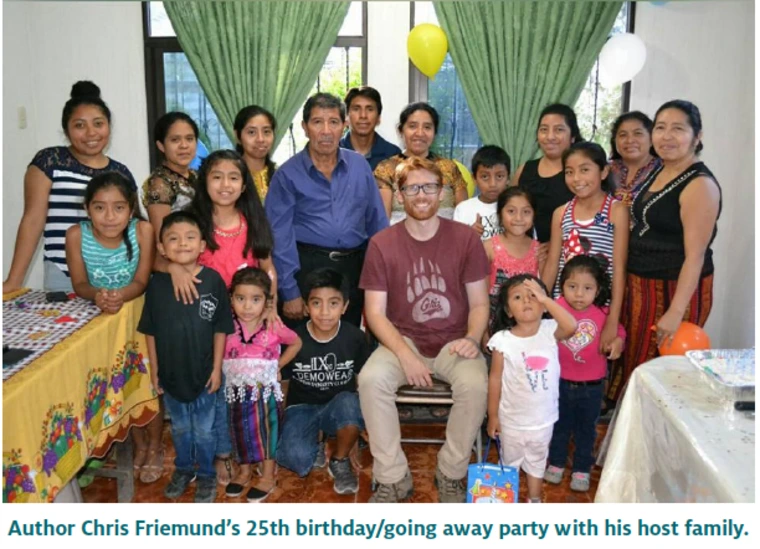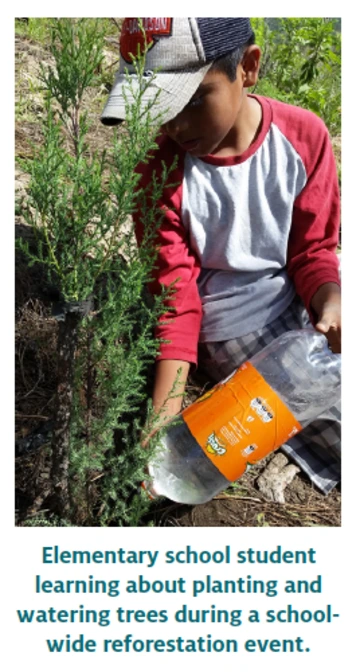by Christopher Freimund, WRRC Graduate Outreach Assistant

How do you adjust to being put in a context that feels completely outside of your understanding of the world? When everything seems foreign, from the way people dress, the language spoken, food available, religious ideology, to work ethic, how do you adapt? Can you relate to people? How do you communicate? These are a few examples of the type of questions that all Peace Corps volunteers have to reconcile within themselves at some point in their service. If you are fortunate and open minded, the answers to these questions can lead to personal growth, greater understanding, collaboration, cultural sharing, and creating a feeling of home and family. Upon departure, having spent two years within a new way of being, the next question becomes, how do you take that growth and those internal changes and reconcile them within your original world context?
I was a Peace Corps Volunteer in Guatemala from 2015-2017, where I inevitably encountered these challenges and tried to answer these questions. During those two years I helped coordinate inter-institutional programs at regional, state, and local levels. Through these programs we created plans to strengthen health promotion policy and practice within the public education system. This work included capacity building with teachers, organizing camps for students, policy meetings with the local government, and visits to rural schools to carry out small-scale projects. Although this project was focused on health and education, my work very quickly became environmentally oriented. Sacapulas, the community in which I lived, faces massive deforestation and water scarcity. This is largely due to resource dependence, lack of regulation, and a changing climate. In my work, it became impossible to discuss public health without addressing these large environmental concerns as well.
It was apparent early on that water would be a major issue that would weave throughout many aspects of my service. How do you discuss health practices, hygiene, or nutrition if there is no water available in the school or in nearby communities? My host family and I only received water in our home once every three days for one hour in the morning. We would store this water in a large concrete tub and then use it for cooking, cleaning, laundry, and if you are my 8-year-old host brother, the occasional storing of fish caught nearby. Due to this lack of a reliable municipal water source, the neighboring river was used for everything from bathing to washing clothes. Unfortunately, as there was not a planned-out trash management system, or any kind of water treatment, the river became increasingly contaminated.
In this setting, the focus of my work shifted. I became part of the community Environmental Committee. With this working group, we created a trash management plan for the town to reduce contamination; with help from USAID we formed a climate change adaptation plan; we initiated a bottle garden program in schools with high levels of malnutrition; and implemented a large-scale reforestation effort with students. These experiences in Sacapulas impressed upon me the importance of multi-disciplinary cooperation to deal with complicated environmental and community issues. It was a powerful learning experience that reinforced my educational and career interests to go down a more environmentally oriented path.

Throughout the two years in this community I was able to come to terms with some of those previously posed questions. I became very accustomed to being the tallest person in the room, or having children asking to touch my red hair. I grew to understand the differences in dress, and what region of the country each one was from. I learned to do my laundry by hand, which was a source of entertainment for the women in my host family. I ate tortillas with everything, even pasta, and still frequently crave them. By the end of my service I had a sense of home and family, and fostered a new way of knowing the world. I did not fully realize the impacts of this sense of place until I returned to the U.S. to find that my idea of home had changed.
So, now that I have returned, I am attempting to address that final question. How do I take what I have experienced and learned and incorporate it into a life in the United States? To begin with, my Peace Corps experience showed me the importance of contributing to whatever community I am a part of, it impressed upon me the desire to live simply, even with access to excess, and to appreciate small things previously taken for granted. I am attempting to incorporate all of those lessons into my life here. My work in Sacapulas inspired me to continue focusing my career on environmental issues. This leads me to my graduate studies in Natural Resources at the University of Arizona, steered by a particular interest in the interconnectedness between community resource management and resilience. It thoroughly instilled in me the importance of safe and reliable water resources, which connects me to my work at the Water Resources Research Center on campus. Although the setting and the systems in place are very different, there are similarities in the issues faced in my Peace Corps community and those faced here in Arizona, particularly in relation to water. Tucson seems to be the right place for me to take my experiences and incorporate them into a new community while continuing to learn and explore these issues that interest me.

